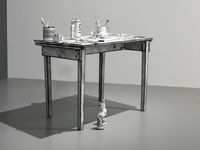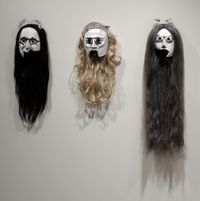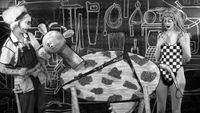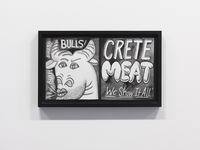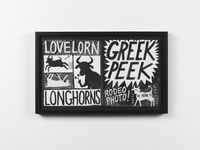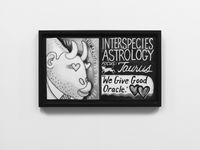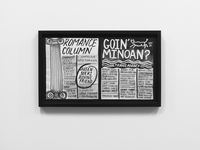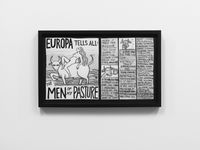Mary Reid Kelley largely acts as the sole performer in her black-and-white videos, which are characterised by tragicomic narratives that explore the experiences of women throughout mythology and history. Heavily made up in a graphic style reminiscent of cartoonised clowns or skeletons, Reid Kelley's characters speak in puns and rhymes.
Read MoreReid Kelley collaborates with her partner, Patrick Kelley, who digitally combines textures from the artist's drawings and paintings with her greenscreen performances. Reid Kelley writes the scripts and creates the sets, props, and costumes for her videos.
An ongoing concern in Reid Kelley's works addresses the untold experiences of women during World War I. In 2016, the artist told Hyperallergic that 'we didn't lose those stories through carelessness', but through suppression. By giving these anonymous women a voice through her works, Reid Kelley offers alternatives to dominant histories that privilege male narratives.
The women in Reid Kelley's works are varied in their occupation and dilemmas. A nurse speaks in euphemisms to disguise the horror of death in The Queen's English (2008), where the dying soldiers appear as abstract shapes to suggest a total collapse of meaning during war; in Sadie the Saddest Sadist (2009), a munitions worker ends up contracting a venereal disease from her sailor lover. You Make Me Iliad (2010), set in German-occupied Belgium in 1918, is a mock-epic about a sex worker and her relationship with a German client.
Often drawing from Greek mythology, Mary Reid Kelley rewrites ancient stories and archetypes. Priapus Agonistes (2013), the first in her Minotaur trilogy, reimagines the figure of the Minotaur as a hybrid between a beast and a woman, instead of a man; Swinburne's Pasiphae (2014) challenges historical feminine ideals by representing a bikini-clad Pasiphae with an abundance of pubic hair.
In The Thong of Dionysus (2015), the last installment of the trilogy, Reid Kelley explores the myth of Ariadne, which recounts her abandonment by her lover, Theseus. In Reid Kelley's version, Ariadne, following a failed attempt at suicide, encounters Dionysus and three of his followers, who extol the joys of drunkenness and embracing absurdity.
In This is Offal, first performed at London's Tate Modern in 2015, Reid Kelley plays a dead woman, whose organs argue about their confusion over her death and their subsequent fate. Inspired by Thomas Hood's The Bridge of Sighs (1844), a poem about a woman who drowned herself, Kelley's performance satirises the literary tradition of romanticising suicide commited by young and beautiful women. This is Offal has also been staged at STUK, Leuven, and Berliner Festspiele, Berlin, in 2016.
Performed in her signature verse, Reid Kelley narrates the final moments from within a fictional submarine in In the Body of the Surgeon (2017), set towards the end of World War II. In 2021, the video was presented in the third Daata Fair by Pilar Corrias.
Mary Reid Kelley holds a BA from St. Olaf College, Minnesota (2001) and an MFA from Yale University (2009). She was a MacArthur Fellow in 2016.
Kelley has exhibited internationally, holding solo exhibitions that include Rand/Goop, Studio Voltaire, London (2019); Mary Reid Kelley and Patrick Kelley: We Are Ghosts, Baltimore Museum of Art, Maryland (2018) and Tate Liverpool (2017); A Marquee Piece of Sod: The WWI Films of Mary Reid Kelley, Kunsthalle Bremen, Germany (2017); We're Wallowing Here in Your Disco Tent, High Line, New York (2016); Mary Reid Kelley, Museum Leuven (2016); The Thong of Dionysus, Fredericks & Freiser Gallery, New York (2015); Hammer Projects: Mary Reid Kelley, Hammer Museum, Los Angeles (2015); and Mary Reid Kelley, Neuer Kunstverein Wien, Vienna (2014).
Selected group exhibitions include Gray Matters, Wexner Center for the Arts, Columbus, Ohio (2017); Mixtape 2016, Pilar Corrias, London (2016); By the Book, Sean Kelly Gallery, New York (2015); Doublespeak, Utah Museum of Contemporary Art, Salt Lake City (2011); and Ludicrous!, Institute of Contemporary Art, Philadelphia (2010).
Sherry Paik | Ocula | 2021
